The Lindt Home Of Chocolate Is Where Every Chocolate Lover’s Dream Comes True https://ift.tt/3BNzdIH
When Roald Dahl’s iconic Charlie and the Chocolate Factory was adapted into a film, it was such a visual treat – the kind that made every kid every kid wish they could go to a house filled with candies and chocolate. The chocolate river in the movie had me wishing fervently that it was real and I could, on a lucky day, take a dip in it and shove spoonfuls in my mouth. Sure, not the most hygienic perhaps but we’re all mere mortals in the face of a pool full of chocolate. So when I walked into the Lindt Home of Chocolate in Zurich, Switzerland and saw a 30 ft tall chocolate fountain pouring over an enormous Lindt ball, I felt like my childhood dream had come true. And before you ask, no, I did not take a dip in it though believe you me, I was tempted.
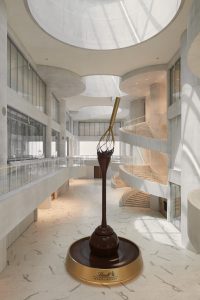
Beginning With The Bean
I start my one-hour guided tour that takes me through the process of chocolate making through a multi-media exhibition. The first part takes me on a journey to the forests of Ghana where I learn everything from types of cocoa and how it is grown to how the beans are produced and used for making Lindt chocolate, while also understanding how the brand supports farming communities, and sustainable and fair trade practices. In fact, even the pulp of the cocoa bean can be utilised–you can extract its raw juice and drink it. It’s tastes very similar to lychee, and I would have definitely asked for more but I was saving that space for some chocolate delights instead.
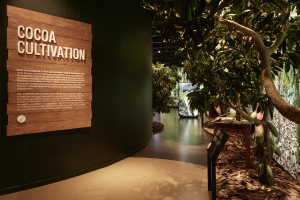
History Of Chocolate
Walking ahead, I enter the next part that takes me through the history of chocolate. It’s a common notion that the Swiss are responsible for the invention of chocolate. However, its origin dates way back to the Mayan era in Central America when chocolate first came into existence. They consumed chocolate in the form of a spicy drink called ‘xocolatl.’ Fast forward to 1528 and the conquistador Hernán Corté brought cocoa to Europe where the chocolate drink was enjoyed at the Spanish court. From then on, cocoa grew to be a fashionable beverage, gradually conquering the taste buds of the European aristocracy. In the 18th century, natural scientist Carl von Linné awarded the cocoa tree a heavenly status of “food of the gods”. Thereafter, people started coming from far off to learn the art of chocolate making.
The Swiss Pioneers
The next room takes you through some of the noteworthy names that gave chocolate its smooth mouthfeel. I learn about François-Louis Cailler from Italy, who opened Switzerland’s first chocolate factory in Corsier-sur-Vevey, Switzerland in 1819. But even then, chocolate was still consumed in liquid form. It was only in the 19th century that the invention of the mechanical press and the single bar production plant helped in making cocoa powder and solidifying chocolates into bars. However, this invention still gave chocolate a bitter, hard and rough texture. That’s when the Swiss expertise came into being. Brands like Gala Peter, Nestle, Tobleron, Cailler, Sprüngli came up with innovative ways to give chocolate its smooth texture.
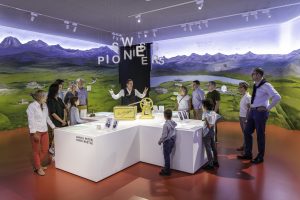
How Lindt Became A Revolutionary Chocolate
It was Lindt that perfected the melt-in-your-mouth chocolate with the help of a roller machine aka the Conching Machine, which you’ll see at the centre of the room in all its glory. And the success story is quite interesting. One night, Rodolphe Lindt’s brother advised him to heat the roller machine, leave it running for longer and add more cocoa butter to the mixture. Legend say that Rodolph left the machine running for three days and three nights without interruption while he attended a hunting weekend. No one know if this was a mistake or intentional as the resulting mixture from the machine was dark and velvety, and released beautiful aromas. It melted as soon as you placed it on your tongue. And that’s the secret behind the smooth Lindt chocolates that we all love to eat today.
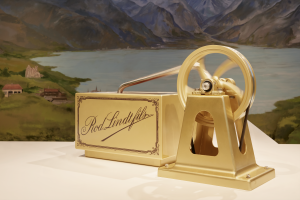
Time To Indulge
After absorbing all that knowledge and learning everything about chocolate creation and cultivation, my palate was craving the chocolate. So the next part of the exhibition gets me to the stations where I get to grab a spoon and take a spoon full of milk, dark and white chocolate. And that’s not all. You can also catch squares of a variety of flavoured chocolates that are released from machines.
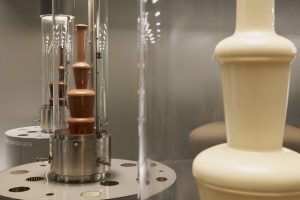
Pilot Plant
Following the passage that displays the moulds and packaging of Lindt from the earlier days, I head out of the tour and walk towards the massive pilot plant. Here, experts develop new recipes, refine production techniques and gather valuable practical experience. But what is more interesting is that you get a peek into the behind the scenes, and follow a product every step of the way it is produced–right from the shell forming and filling to de-moulding and wrapping.
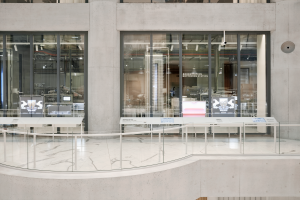
Be Your Own Willy Wonka
Now that you’ve learnt so much about chocolate production, why not put on a chef’s hat and try making some? The Lindt Home of Chocolate gives you the chance to make your own chocolate with the help of its master craftsmen. I got to make the signature Lindt Teddy mould as well as decorate my own chocolate truffles. Needless to say, I emerged a proud chocolatier!
Then, Indulge Some More
On your way out, don’t forget to drop by Lindt biggest chocolate shop where you’ll be spoilt for choice. Leaving the museum with a bag full of chocolates is a must. And if you haven’t satisfied your sweet tooth yet, can also choose to savour some hot chocolate or fresh, handmade waffles and ice cream creations topped with the finest chocolate sauce at the Lindt Cafe.
From experiencing indulgent chocolates, learning its history to understanding the importance of sustainable practises in the chocolate making world, you not only leave the Lindt Home Of Chocolate with endorphins, but also come out as a conscious chocolate connoisseur.
Planning a trip to Switzerland and want to book your tour at LHOC? Book your tickets here.
from Elle India
Comments
Post a Comment